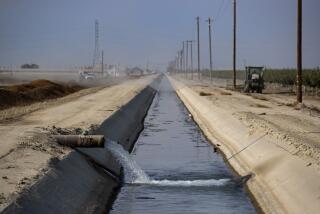Panel of U.S. Scientists Studies Water Cuts in Klamath Basin
- Share via
SACRAMENTO — A federal scientific panel convened here Tuesday in an effort to settle the roiling debate over water cutbacks to drought-stricken Klamath Basin farmers.
Like an umpire deciding the fate of a pivotal ballgame, the National Research Council is set to pass judgment on scientific findings that slashed water deliveries because of concerns for endangered fish.
“We seek your expertise; we ask your advice,” Sue Ellen Wooldridge, U.S. Department of Interior deputy chief of staff, told the dozen scientists who make up the panel.
An initial report is expected in early January, possibly in time to affect water allotments next year in the bountiful agricultural region straddling California’s border with Oregon.
Federal officials asked for help after debate raged over a decision in April to slash water deliveries to assist two species of endangered suckerfish in Oregon’s Upper Klamath Lake and coho salmon downstream.
Klamath farmers, whose dire economic straits have made them a rallying point for opponents of the federal Endangered Species Act, contend that flawed biology opinions were used to justify the water cutbacks.
They say a more thorough review of all research will prove that farmers and fish can coexist even in the driest of years. This year was the basin’s third-driest in nearly a half-century.
“We feel adamantly that the science used this year was wrong,” said Lon Baley, who was able to plant only about 20% of his usual 3,000 acres of potatoes and onions.
Bob Gasser, a fertilizer dealer, said federal decision makers “never considered the human factor.”
But environmentalists, fishermen and several Indian tribes contend that the science was well grounded and the water reductions justified.
Felice Pace of the Klamath Forest Alliance said the crisis has become part of “an orchestrated attempt” to intimidate government scientists and erode the Endangered Species Act.
Glen Spain, representing commercial fishermen, said the science will survive the scrutiny. “This will eliminate a lot of the myth and denial,” he said.
More to Read
Sign up for Essential California
The most important California stories and recommendations in your inbox every morning.
You may occasionally receive promotional content from the Los Angeles Times.













